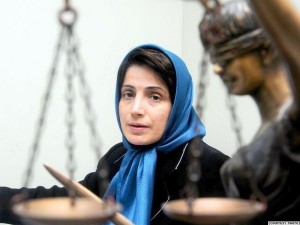 The UN High Commissioner for Human Rights, Navi Pillay, says she is extremely concerned about the health of the Iranian human rights activist, Nasrin Sotoudeh.
The UN High Commissioner for Human Rights, Navi Pillay, says she is extremely concerned about the health of the Iranian human rights activist, Nasrin Sotoudeh.Ms Sotoudeh is in the seventh week of a hunger strike in Tehran's Evin prison.
Her family says she has lost a lot of weight and her blood pressure is now abnormally low.
She is serving a six-year sentence for acting against national security and spreading propaganda.
The Iranian government says Ms Sotoudeh is in good health, but the Iranian lawmaker Mohammad Hassan Asfari told the semi-official Labour News Agency on Sunday that a parliamentary commission would visit the prison to assess her condition.
"If the stories regarding Ms Sotoudeh are true, we will request an explanation from [the justice minister]," Mr Asfari was quoted as saying.
Her husband, Reza Khandan, said that when he visited her at the weekend, she was weak and suffering from an upset stomach, preventing her from drinking salt and sugar solutions.
In an email to the Reuters news agency, Mr Khandan wrote: "Most likely in the next few days they will have to take her to the hospital."
Ms Sotoudeh began her hunger strike after a travel ban was imposed on her 12-year-old daughter, Mehraveh, in June. The UN High Commissioner for Human Rights, Navi Pillay urged the Iranian government to address Ms Sotoudeh's situation by lifting the travel ban and other sanctions on her family.
The UN regards the imprisonment of Ms Sotoudeh as arbitrary and a human rights violation, and says it regards as a disturbing trend the prosecution of activists and the imposition of sanctions on their family members.
Ms Sotoudeh had worked as a lawyer defending journalists and human rights activists, including the Iranian Nobel laureate Shirin Ebadi.
She was awarded the Sakharov Prize for Freedom of Thought this year, together with the Iranian filmmaker Jafar Panahi.
By BBC News
The Iran Project is not responsible for the content of quoted articles.











